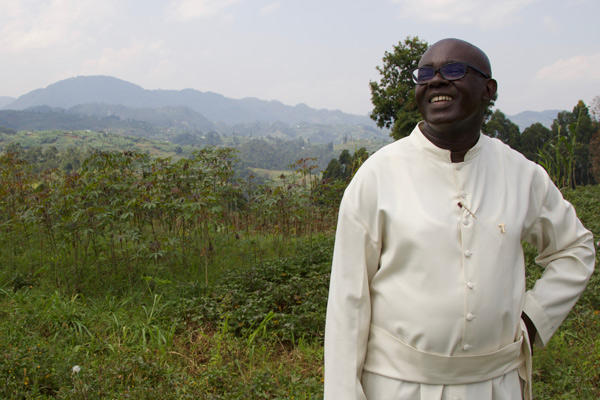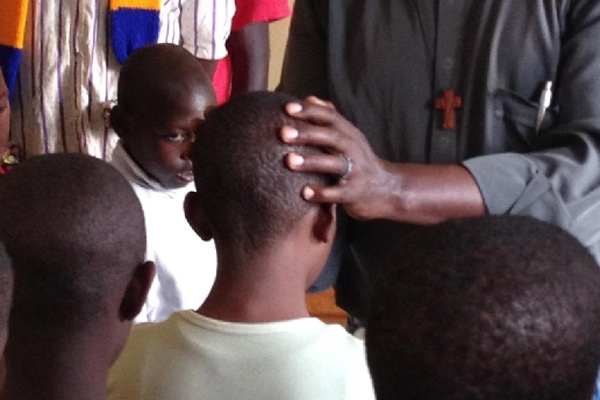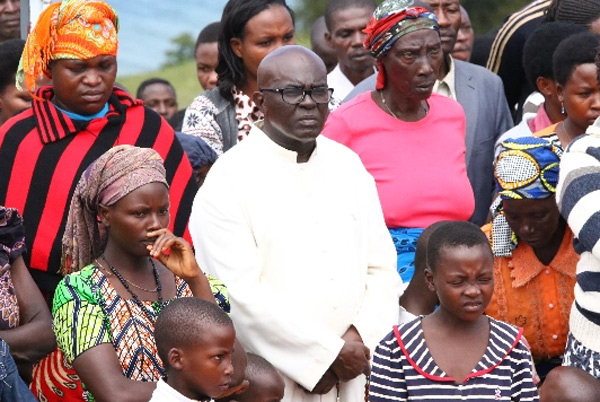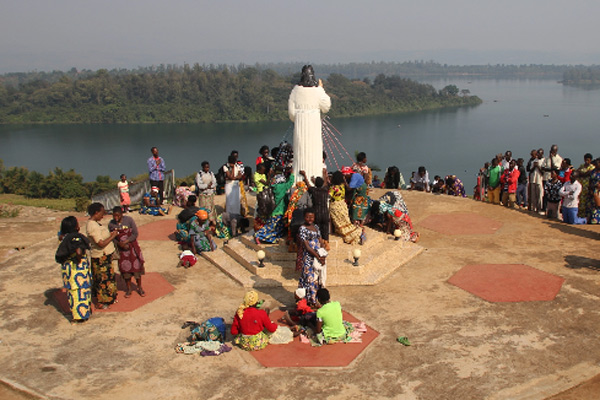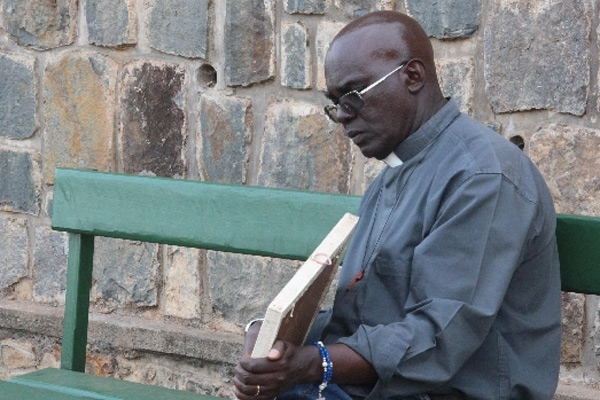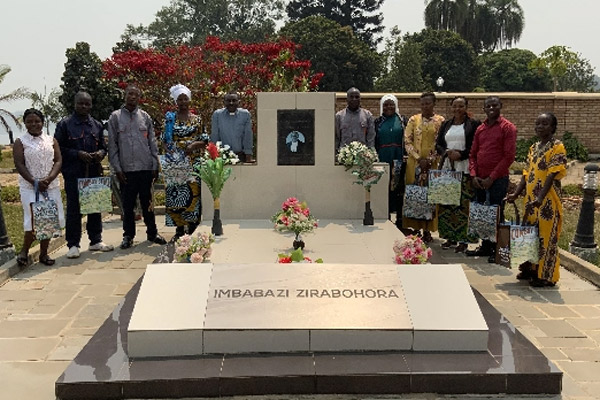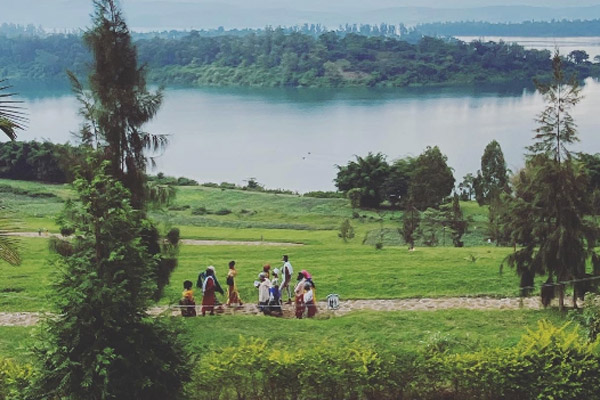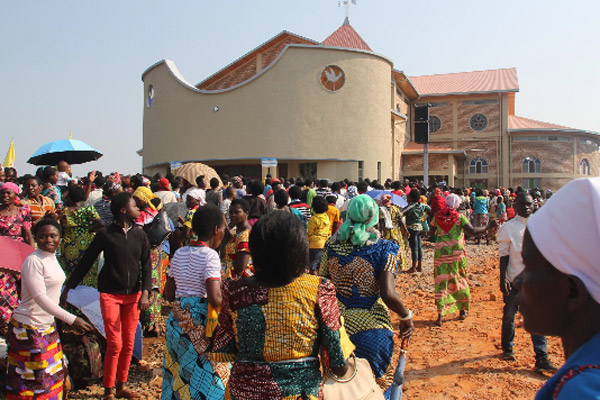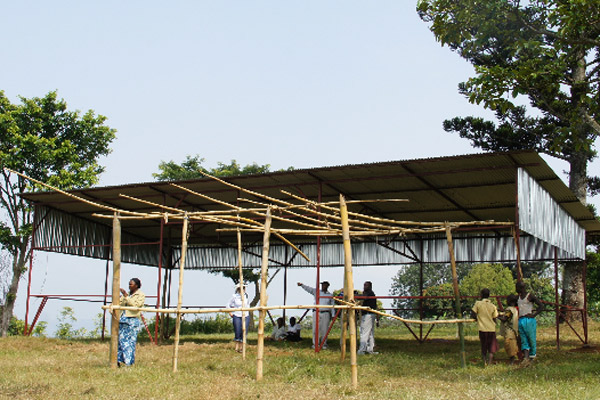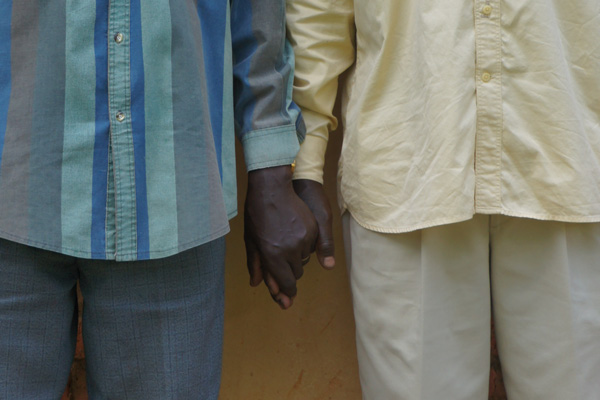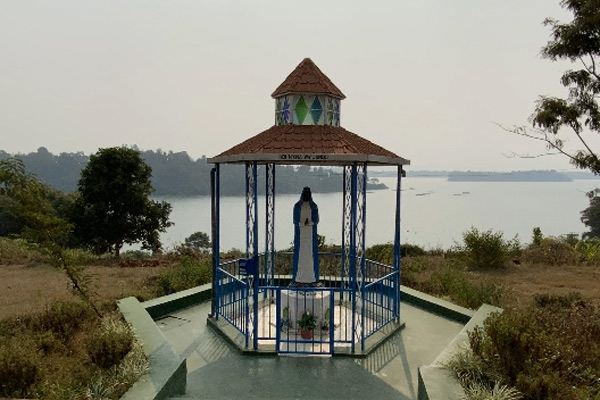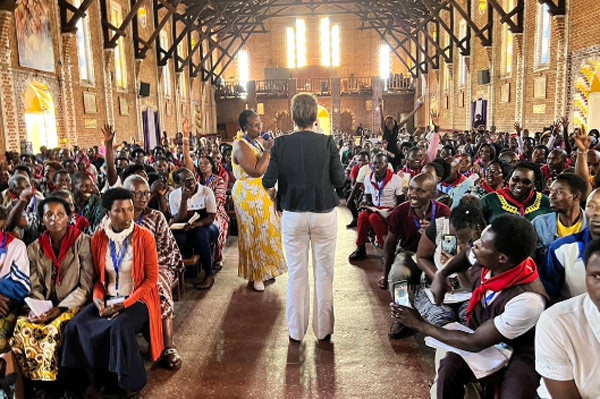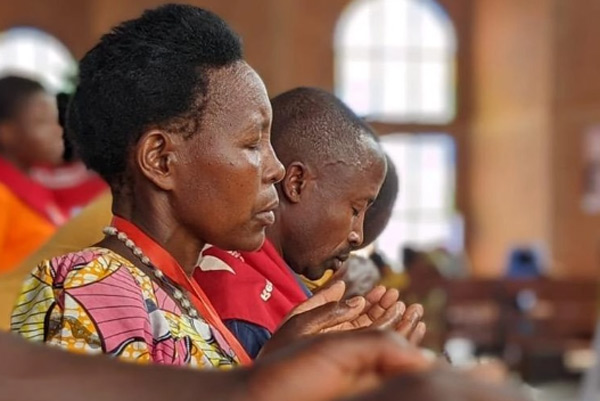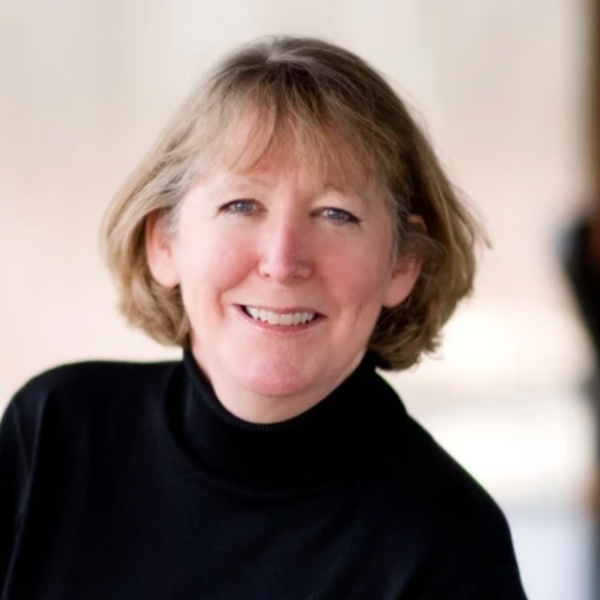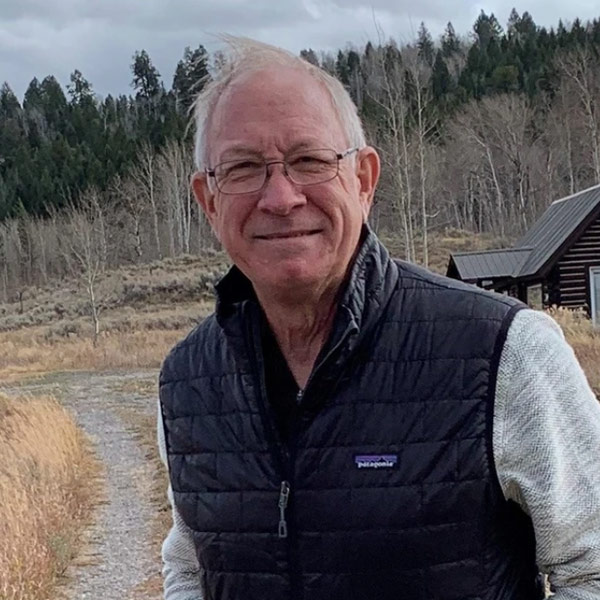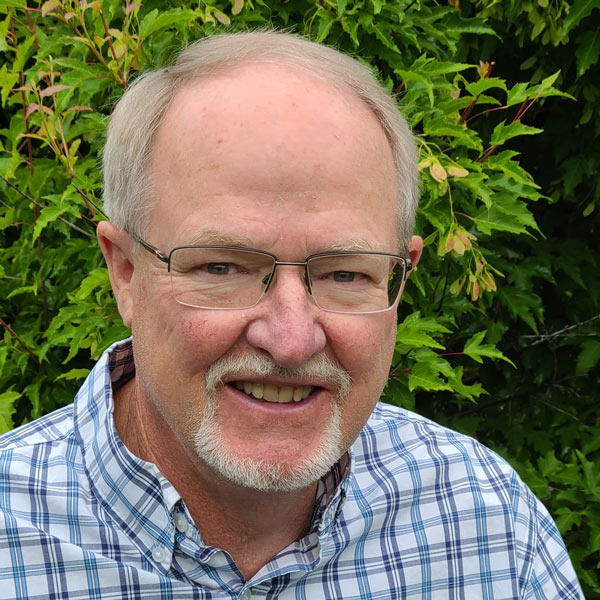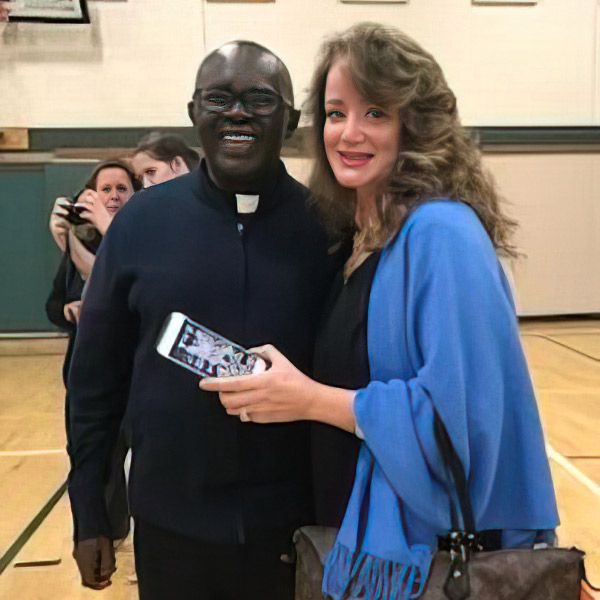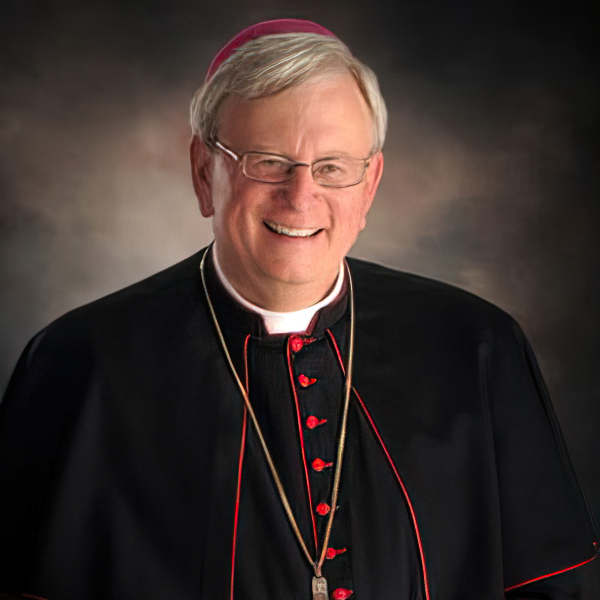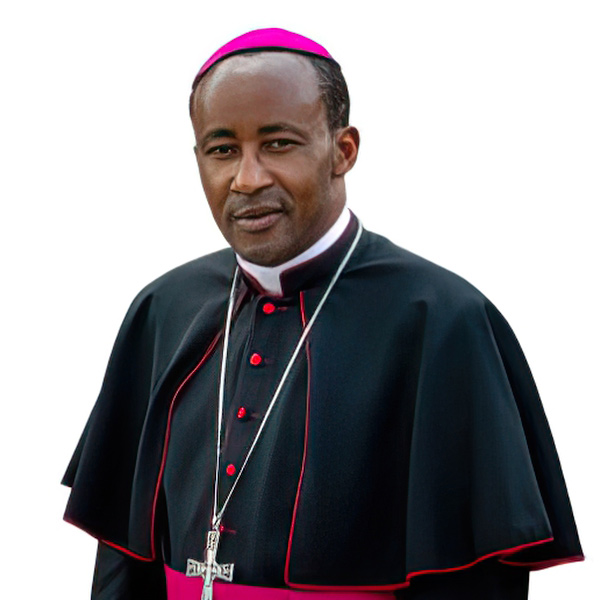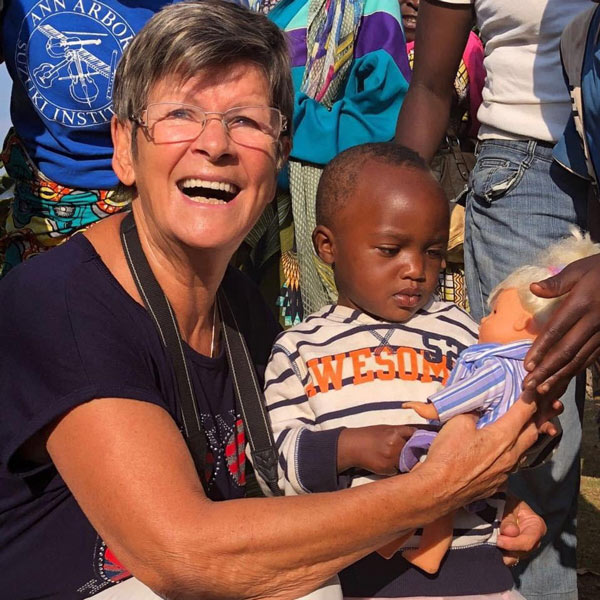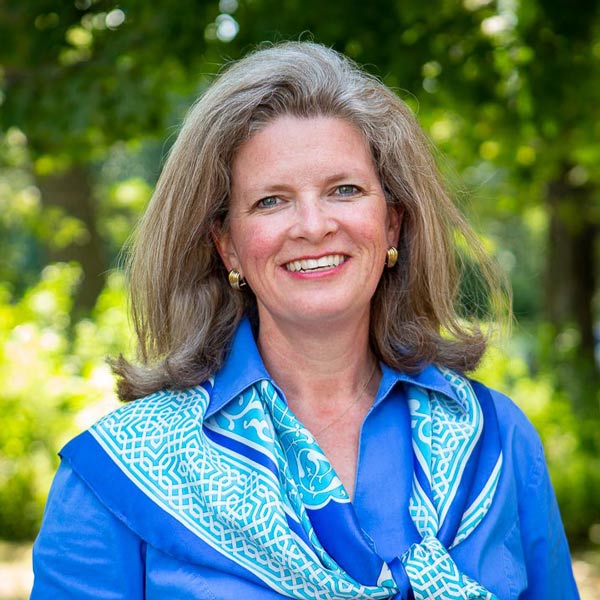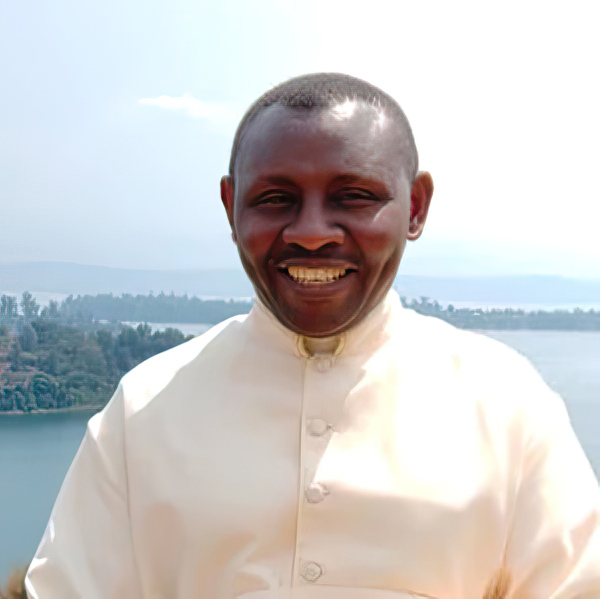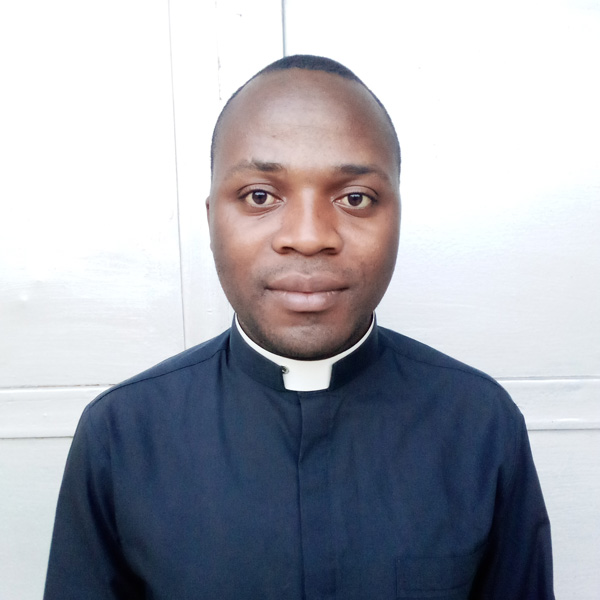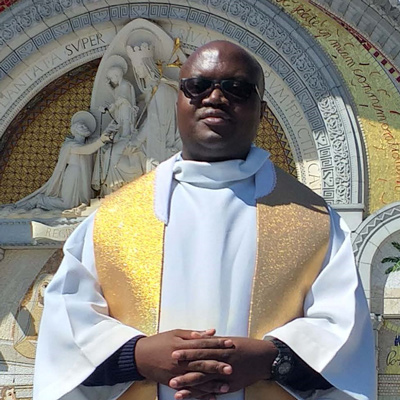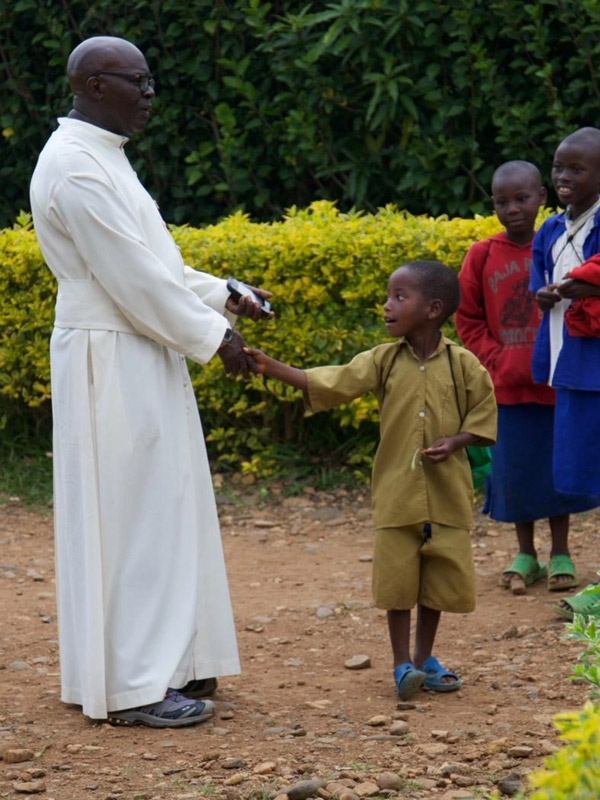
The Life and Legacy of Fr Ubald Rugirangoga
1955 - 2021
Father Ubald Rugirangoga, a Catholic priest from Rwanda, lived an extraordinary life. Despite the horrors of genocide that impacted his life, his unwavering faith and love for Jesus Christ turned his terror and grief into a triumph of love, forgiveness, and reconciliation.
Radiating joy, Fr. Ubald guided his fellow Rwandans—and later, people worldwide—to spiritual and emotional freedom, and many were healed from physical, emotional and spiritual issues through his prayer.
“Extreme horror requires extreme forgiveness.”
The Life and Legacy of Fr Ubald Rugirangoga
1955 - 2021
Father Ubald Rugirangoga, a Catholic priest from Rwanda, lived an extraordinary life. Despite the horrors of genocide that impacted his life, his unwavering faith and love for Jesus Christ turned his terror and grief into a triumph of love, forgiveness, and reconciliation.
Radiating joy, Fr. Ubald guided his fellow Rwandans—and later, people worldwide—to spiritual and emotional freedom, and many were healed from physical, emotional and spiritual issues through his prayer.
“Extreme horror requires extreme forgiveness.”

Father Ubald’s History
Fr. Ubald grew up under the shadow of tribal tensions. The eldest of four, when Ubald was only seven, his father, uncle, and several other family members were murdered because of their Tutsi ethnicity. This horror extinguished much of the joy that so characterized his family’s life. Raised in the faith by his widowed mother, Ubald felt called to become a priest to preach love. He wanted to follow the example of Jesus, the Good Shepherd, and lead people in the faith. His journey to becoming a priest was filled with obstacles, setbacks, doubts, and even ethnic raids in the seminary. Persevering through them all, Fr. Ubald was ordained a priest in 1984.
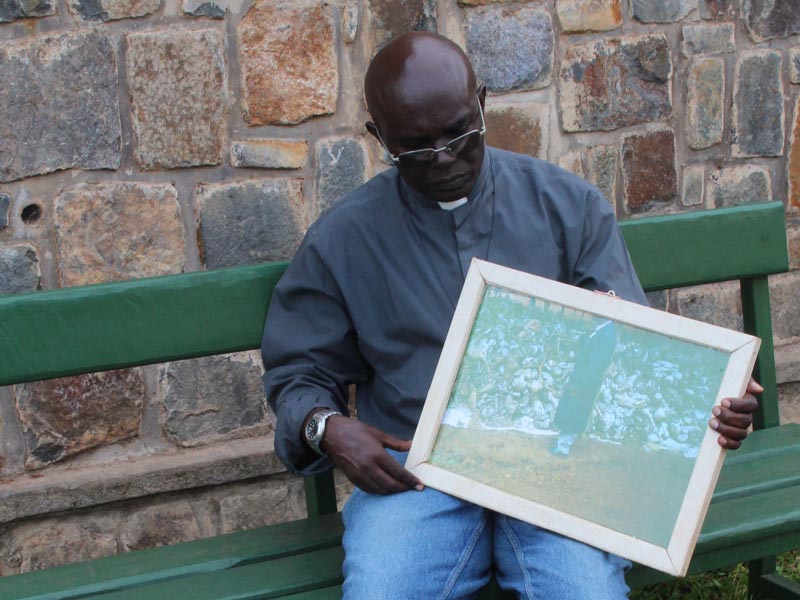
He intentionally chose to preach and live the message of God’s healing love. He formed a prayer group that prayed for healing, and many people were healed through those prayers. After several years, Fr. Ubald began to hear God’s voice directly telling him of healings, and he used this gift of knowledge to pray even more effectively for people in need of healing.
When the 1994 Genocide broke out in Rwanda, more than 80 members of Fr. Ubald’s family were murdered in the genocide, including his mother. He also lost more than 45,000 parishioners who were killed. Fr. Ubald himself was chased from his parish and took refuge in the Bishop’s house. He was warned that the Hutus from his parish wanted to kill him and put his head on a stick for all to see. When he sought The Lord, He told him to escape because God had a mission for him. So he escaped through the Congo in the middle of the night. The darkness of death overwhelmed him, and he cried tears of guilt and sorrow for months. He believed he had failed in his efforts to preach and teach others to love one another.
Fr. Ubald made his way to France where friends took him to the sanctuary of healing in Lourdes. While making the Stations of the Cross, Fr. Ubald heard Jesus say “Ubald, accept your cross,”—the cross of genocide. In that moment he experienced light breaking through his darkness, inexplicable healing from his grief, and knew God had a new mission for him.

Father Ubald’s History
Fr. Ubald grew up under the shadow of tribal tensions. The eldest of four, when Ubald was only seven, his father, uncle, and several other family members were murdered because of their Tutsi ethnicity. This horror extinguished much of the joy that so characterized his family’s life. Raised in the faith by his widowed mother, Ubald felt called to become a priest to preach love. He wanted to follow the example of Jesus, the Good Shepherd, and lead people in the faith. His journey to becoming a priest was filled with obstacles, setbacks, doubts, and even ethnic raids in the seminary. Persevering through them all, Fr. Ubald was ordained a priest in 1984.
He intentionally chose to preach and live the message of God’s healing love. He formed a prayer group that prayed for healing, and many people were healed through those prayers. After several years, Fr. Ubald began to hear God’s voice directly telling him of healings, and he used this gift of knowledge to pray even more effectively for people in need of healing.
When the 1994 Genocide broke out in Rwanda, more than 80 members of Fr. Ubald’s family were murdered in the genocide, including his mother. He also lost more than 45,000 parishioners who were killed. Fr. Ubald himself was chased from his parish and took refuge in the Bishop’s house. He was warned that the Hutus from his parish wanted to kill him and put his head on a stick for all to see. When he sought The Lord, He told him to escape because God had a mission for him. So he escaped through the Congo in the middle of the night. The darkness of death overwhelmed him, and he cried tears of guilt and sorrow for months. He believed he had failed in his efforts to preach and teach others to love one another.
Fr. Ubald made his way to France where friends took him to the sanctuary of healing in Lourdes. While making the Stations of the Cross, Fr. Ubald heard Jesus say “Ubald, accept your cross,”—the cross of genocide. In that moment he experienced light breaking through his darkness, inexplicable healing from his grief, and knew God had a new mission for him.
“Forgiveness Makes You Free”
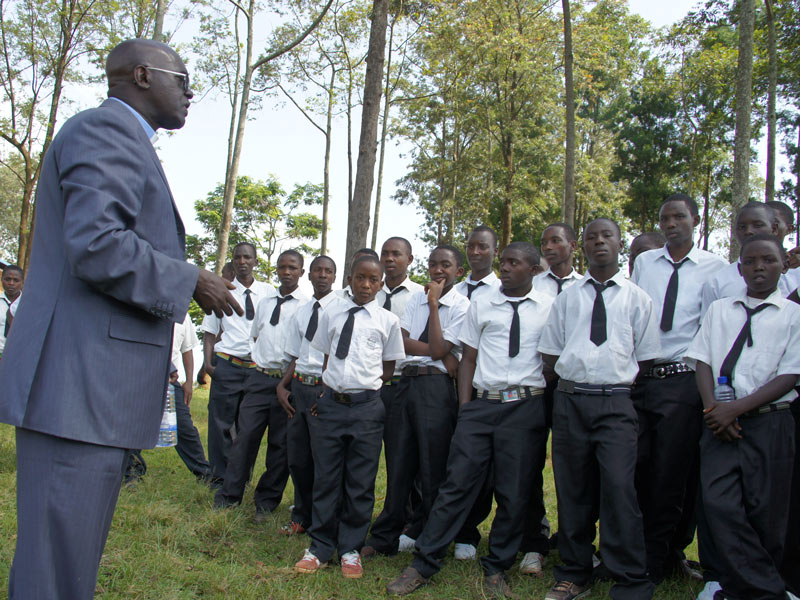
Father Ubald’s Mission
For more than 25 years Father Ubald tirelessly and relentlessly preached and taught forgiveness and reconciliation across Rwanda. He brought victims and perpetrators together and led them through the process of forgiveness and reconciliation to a newfound place of healing. The Rwandan government sought him out for advice on forgiveness and reconciliation as the country continued to rebuild from the ruins and devastation of the genocide.
In 2009, at the invitation of fellow Rwandan and genocide survivor, Immaculée Ilibagiza, Fr. Ubald brought his message of forgiveness, reconciliation, and healing to the United States. For 12 years he spent months at a time traveling across the United States preaching forgiveness and holding healing Masses and services in Catholic parishes and Christian communities. He also continued to visit and preach across Europe and developed a worldwide following.

Father Ubald’s Mission
For more than 25 years Father Ubald tirelessly and relentlessly preached and taught forgiveness and reconciliation across Rwanda. He brought victims and perpetrators together and led them through the process of forgiveness and reconciliation to a newfound place of healing. The Rwandan government sought him out for advice on forgiveness and reconciliation as the country continued to rebuild from the ruins and devastation of the genocide.
In 2009, at the invitation of fellow Rwandan and genocide survivor, Immaculée Ilibagiza, Fr. Ubald brought his message of forgiveness, reconciliation, and healing to the United States. For 12 years he spent months at a time traveling across the United States preaching forgiveness and holding healing Masses and services in Catholic parishes and Christian communities. He also continued to visit and preach across Europe and developed a worldwide following.
Father Ubald’s Impact
He befriended people of every walk of life and faith background sharing with them God’s love and healing. He officiated over Masses in stadiums with up to 80,000 attendees. Thousands of miracles have been attributed to his prayers. Countless have been converted to a deeper relationship with Jesus Christ.
Fr. Ubald established the Center for the Secret of Peace in Rusizi, Rwanda. A place of pilgrimage and healing that hosts thousands of visitors each month from Rwanda, Africa, Europe, Australia, and the United States.
Fr. Ubald co-founded the Missionaries of Peace of Christ the King with Sister Donata Uwimanimpaye. This order of religious brothers and sisters promotes the spiritual and social welfare of the people of Rwanda and surrounding nations in East Africa, serving in schools and offering parish missions, spreading the message of God’s love.
Fr. Ubald died January 7, 2021 after a lengthy illness that began with the covid virus. He is buried at the Center for the Secret of Peace in Rwanda.
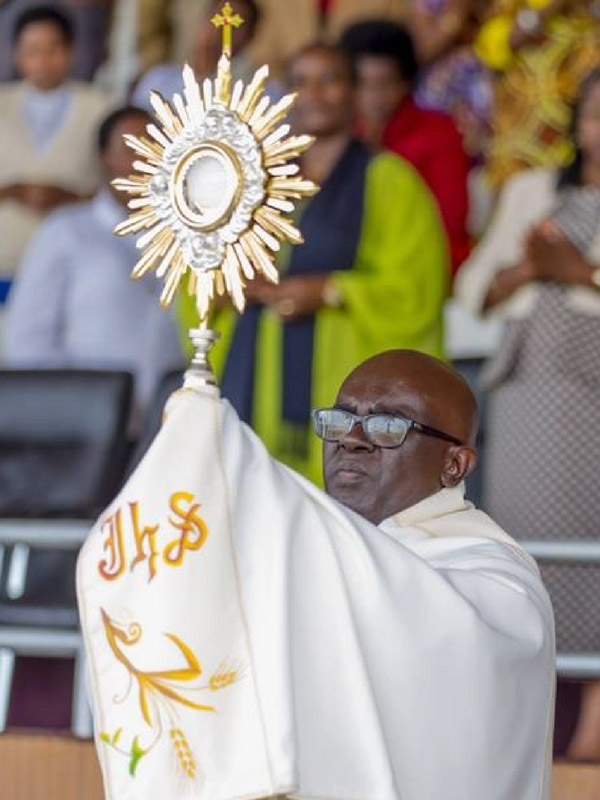
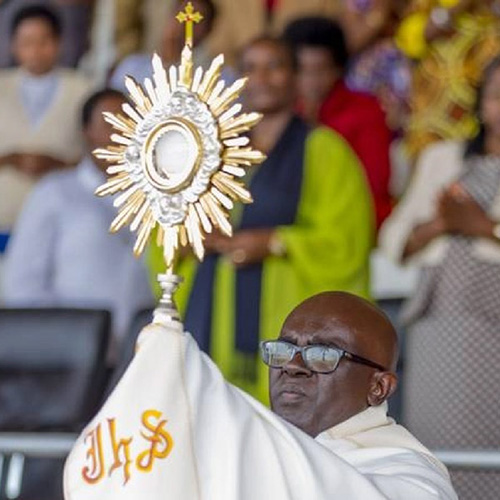
Father Ubald was filled with unspeakable joy and gratitude. His smile radiated an indescribable peace and joy.
He befriended people of every walk of life and faith background sharing with them God’s love and healing. He officiated over Masses in stadiums with up to 80,000 attendees. Thousands of miracles have been attributed to his prayers. Countless have been converted to a deeper relationship with Jesus Christ.
Fr. Ubald established the Center for the Secret of Peace in Rusizi, Rwanda. A place of pilgrimage and healing that hosts thousands of visitors each month from Rwanda, Africa, Europe, Australia, and the United States.
Fr. Ubald co-founded the Missionaries of Peace of Christ the King with Sister Donata Uwimanimpaye. This order of religious brothers and sisters promotes the spiritual and social welfare of the people of Rwanda and surrounding nations in East Africa, serving in schools and offering parish missions, spreading the message of God’s love.
Fr. Ubald died January 7, 2021 after a lengthy illness that began with the covid virus. He is buried at the Center for the Secret of Peace in Rwanda.
Father Ubalds legacy lives on in the hearts and souls of all who knew and loved him. The Center for the Secret of Peace carries on his ministry of healing with weekly Masses. Thousands of visitors stream to the center monthly to pray and attend Mass and to visit his tomb. As a member of the community of saints, we believe he continues to pray for us, and to remind us that “Jesus is alive” and “Forgiveness sets you free.”
In his own words:
The Life and Legacy of Fr Ubald Rugirangoga
Refuge in Burundi
It was Sunday evening 26/02/1973, when seminarians from Hutu ethnicity wanted to kill those from Tutsi ethnicity. The priests who couldn’t control the situation helped us to escape. In fact, it was politicians who had excited the Hutu seminarians in order to make trouble in society. Arriving at home it was also trouble. We had no choice, my brother and I, we left our mother, and fled to Burundi where I went on studying from 1973 till 1978. As a teenager, I lost my faith and was converted by the Virgin Mary when praying the rosary.
My conversion
It was an afternoon coming back from playing football at 16ho’clock when Nasaire Kibuti shared with me that he felt well, that he had to go and take shower, pray his rosary and then study. I didn’t understand because I was one of those who didn’t like prayers even though we were in priesthood school. It was a heated discussion with him trying to convince me to pray. At that time Prayer had no place in my life. Nasaire had lost the argument because we were so many against him, in fact other seminarians came to listen to us discussing on prayer. It was a good debate and many of the others agreed with me. Nasaire went away ashamed and I was so proud for a few minutes, but in my mind I was not so quiet. I went to the chapel to see if Nasaire was praying his rosary. Arriving there I saw Nasaire praying carefully his rosary. He was not alone, there were about 30 other seminarians praying. It was an occasion of conversion and the beginning of the new life. Remarking that there were seminarians who prayed freely without any priest behind them, I took that prayer as serious and tried to pray also. I pray the rosary helped by my fingers because I had no rosary. When it came time to pray the mystery, I did not know the mysteries so thought about my life. When thinking about my life I discovered that God took care of me even if I didn’t pray to him. My question was this “How did my mother have money for school fees, for me and for my brother”?! I remembered the day she had wept when we took all the money from the house at the beginning of the school year. There was no doubt in my mind God had helped her to get the money and also because we were refugees, HCR had helped us with school fees. I discovered the presence of God in my life. I felt happy, I had prayed. The days after, I continued praying the rosary and the conviction of God’s love became so great to me that I decided to offer all my life to him by becoming a priest. Yes, I had to become a priest in order to preach love in Rwanda. If I was a refugee in Burundi, it meant that Rwandese people didn’t love each other. In 1978, I was finished with minor seminary studies in Burundi and went back to Rwanda.
Back to Rwanda in order to preach love
I arrived in Rwanda in 1978 and began with my major studies in the seminary of Nyakibanda. In July 1984 I was ordained a priest and had my first mission in Nyamasheke parish, cyangugu Diocese in Rwanda. I tried to preach love and live love. In 1987, I felt a new vocation to pray for healing of sick people. In 1991 I received from God a knowledge gift. I was the pastor in the parish, happy to serve God. I preached many retreats at the parish in order to help Christians to grow in faith and love. What a horrible surprise when the genocide against the people from tutsi ethnicity occurred.
I realised that people from hutu ethnicity in my parish, killed their brothers and sisters in faith. Myself I escaped miraculously, they wanted me to be killed also, they didn’t recognise me as their pastor. What a pity, 45000 people from tutsi ethnicity were killed in 3 days. They were, refugees at the parish. This news devastated me at the Bishop’s house where I was a refugee after being chased from my parish. Every night I wept thinking that I had just failed! To become a priest in order to preach love and live love and as your fruit you have genocide in your parish! At the bishop’s house where I took refuge, people from my parish wanted my head to be cut off and to have a procession with it on a stake. First, I was ready to be killed and accompany many of my parishioners put on the sword to heaven. When I was praying I listened to God’s voice telling me that I had to get refuge abroad because he wanted me to survive and evangelise. In the evening of 27/5/1994, I escaped with a guide through the bush; we crossed the Rusizi River and arrived in Congo, former Zaire, in the morning of 28/5/1994. I escaped the genocide against tutsi to evangelise.
After 2 months in Congo, I have been invited to go to France at paray le Monial and witness that Jesus is alive. I arrived there at the end of July. I spoke for the first time to more than 5000 people about what happened in Rwanda. It was horror; it was so hard to forgive, my heart was broken; I claimed that I forgave those who killed my mother, my parishioners, my relatives. Unfortunately I went on weeping every night until I was healed at Lourdes during the Stations of the Cross. I had not accepted my cross to carry. The genocide against people of tutsi ethnicity was for me a cross to carry. Without accepting it as a cross to carry, nobody can forgive.
Forgiveness and reconciliation
From 1995-2009 Following the genocide Fr. Ubald spent working in forgiveness and reconciliation around Rwanda as well as preaching and teaching in Austria and Europe. 2009 was his first time to the USA. He was pastor at Mushaka Parish where he started the Mushaka program in reconciliation. He was released as pastor from Mushaka after 12 years and went to reside at the Bishop’s house, where he worked as a full time evangelist and Director at the Center for the Secret of Peace.
The genocide against the Tutsis had hurt me so much that I felt tired. I was like a commander of an army who had lost the fight. I needed new energy to go on fighting. After 6 months in Europe, 6months of rest and prayers. I decided to go back to Rwanda. I arrived in Rwanda 5/01/1995. I had no time to lose, I immediately began to help people with their inner wounds, listening to them, and praying with them. I said masses with healing prayers. Many people were helped and I realised why God told me to go and get refuge abroad when I hid myself in Bishop’s house. It was to evangelise and help people to begin with new life, to speak about forgiveness and reconciliation. It was not easy. The victims of genocide were so angry against to those who made genocide to them. Those who made genocide were not ready to beg pardon even to recognise that they had made genocide. It took a long time to convince the victims to forgive and those who made genocide to beg pardon.
After 4 years of evangelisation, speaking at about forgiveness and reconciliation, praying for healing all over the country, my Bishop gave me a new mission, to be pastor of Mushaka parish. I had been there after evangelisation in prison. I had experience of people who had made genocide against tutsi ethnicity already in prison; I had to have experience of victims of genocide as pastor of the parish. I arrived in the parish when the catholic Rwandese church was helping Christians to think about ethnic problems in synod. I did my best to help parishioners to think about that ethnic problem and they concluded that to be from hutu ethnicity or tutsi ethnicity was not a problem, the real problem was ideology. Every one was created in God’s image. We had to fight together against genocide ideology in society. I helped Christians to fight it by preaching retreats.
In his own words:
The Life and Legacy of Fr Ubald Rugirangoga
Refuge in Burundi
It was Sunday evening 26/02/1973, when seminarians from Hutu ethnicity wanted to kill those from Tutsi ethnicity. The priests who couldn’t control the situation helped us to escape. In fact, it was politicians who had excited the Hutu seminarians in order to make trouble in society. Arriving at home it was also trouble. We had no choice, my brother and I, we left our mother, and fled to Burundi where I went on studying from 1973 till 1978. As a teenager, I lost my faith and was converted by the Virgin Mary when praying the rosary.
My conversion
It was an afternoon coming back from playing football at 16ho’clock when Nasaire Kibuti shared with me that he felt well, that he had to go and take shower, pray his rosary and then study. I didn’t understand because I was one of those who didn’t like prayers even though we were in priesthood school. It was a heated discussion with him trying to convince me to pray. At that time Prayer had no place in my life. Nasaire had lost the argument because we were so many against him, in fact other seminarians came to listen to us discussing on prayer. It was a good debate and many of the others agreed with me. Nasaire went away ashamed and I was so proud for a few minutes, but in my mind I was not so quiet. I went to the chapel to see if Nasaire was praying his rosary. Arriving there I saw Nasaire praying carefully his rosary. He was not alone, there were about 30 other seminarians praying. It was an occasion of conversion and the beginning of the new life. Remarking that there were seminarians who prayed freely without any priest behind them, I took that prayer as serious and tried to pray also. I pray the rosary helped by my fingers because I had no rosary. When it came time to pray the mystery, I did not know the mysteries so thought about my life. When thinking about my life I discovered that God took care of me even if I didn’t pray to him. My question was this “How did my mother have money for school fees, for me and for my brother”?! I remembered the day she had wept when we took all the money from the house at the beginning of the school year. There was no doubt in my mind God had helped her to get the money and also because we were refugees, HCR had helped us with school fees. I discovered the presence of God in my life. I felt happy, I had prayed. The days after, I continued praying the rosary and the conviction of God’s love became so great to me that I decided to offer all my life to him by becoming a priest. Yes, I had to become a priest in order to preach love in Rwanda. If I was a refugee in Burundi, it meant that Rwandese people didn’t love each other. In 1978, I was finished with minor seminary studies in Burundi and went back to Rwanda.
Back to Rwanda in order to preach love
I arrived in Rwanda in 1978 and began with my major studies in the seminary of Nyakibanda. In July 1984 I was ordained a priest and had my first mission in Nyamasheke parish, cyangugu Diocese in Rwanda. I tried to preach love and live love. In 1987, I felt a new vocation to pray for healing of sick people. In 1991 I received from God a knowledge gift. I was the pastor in the parish, happy to serve God. I preached many retreats at the parish in order to help Christians to grow in faith and love. What a horrible surprise when the genocide against the people from tutsi ethnicity occurred.
I realised that people from hutu ethnicity in my parish, killed their brothers and sisters in faith. Myself I escaped miraculously, they wanted me to be killed also, they didn’t recognise me as their pastor. What a pity, 45000 people from tutsi ethnicity were killed in 3 days. They were, refugees at the parish. This news devastated me at the Bishop’s house where I was a refugee after being chased from my parish. Every night I wept thinking that I had just failed! To become a priest in order to preach love and live love and as your fruit you have genocide in your parish! At the bishop’s house where I took refuge, people from my parish wanted my head to be cut off and to have a procession with it on a stake. First, I was ready to be killed and accompany many of my parishioners put on the sword to heaven. When I was praying I listened to God’s voice telling me that I had to get refuge abroad because he wanted me to survive and evangelise. In the evening of 27/5/1994, I escaped with a guide through the bush; we crossed the Rusizi River and arrived in Congo, former Zaire, in the morning of 28/5/1994. I escaped the genocide against tutsi to evangelise.
After 2 months in Congo, I have been invited to go to France at paray le Monial and witness that Jesus is alive. I arrived there at the end of July. I spoke for the first time to more than 5000 people about what happened in Rwanda. It was horror; it was so hard to forgive, my heart was broken; I claimed that I forgave those who killed my mother, my parishioners, my relatives. Unfortunately I went on weeping every night until I was healed at Lourdes during the Stations of the Cross. I had not accepted my cross to carry. The genocide against people of tutsi ethnicity was for me a cross to carry. Without accepting it as a cross to carry, nobody can forgive.
Forgiveness and reconciliation
From 1995-2009 Following the genocide Fr. Ubald spent working in forgiveness and reconciliation around Rwanda as well as preaching and teaching in Austria and Europe. 2009 was his first time to the USA. He was pastor at Mushaka Parish where he started the Mushaka program in reconciliation. He was released as pastor from Mushaka after 12 years and went to reside at the Bishop’s house, where he worked as a full time evangelist and Director at the Center for the Secret of Peace.
The genocide against the Tutsis had hurt me so much that I felt tired. I was like a commander of an army who had lost the fight. I needed new energy to go on fighting. After 6 months in Europe, 6months of rest and prayers. I decided to go back to Rwanda. I arrived in Rwanda 5/01/1995. I had no time to lose, I immediately began to help people with their inner wounds, listening to them, and praying with them. I said masses with healing prayers. Many people were helped and I realised why God told me to go and get refuge abroad when I hid myself in Bishop’s house. It was to evangelise and help people to begin with new life, to speak about forgiveness and reconciliation. It was not easy. The victims of genocide were so angry against to those who made genocide to them. Those who made genocide were not ready to beg pardon even to recognise that they had made genocide. It took a long time to convince the victims to forgive and those who made genocide to beg pardon.
After 4 years of evangelisation, speaking at about forgiveness and reconciliation, praying for healing all over the country, my Bishop gave me a new mission, to be pastor of Mushaka parish. I had been there after evangelisation in prison. I had experience of people who had made genocide against tutsi ethnicity already in prison; I had to have experience of victims of genocide as pastor of the parish. I arrived in the parish when the catholic Rwandese church was helping Christians to think about ethnic problems in synod. I did my best to help parishioners to think about that ethnic problem and they concluded that to be from hutu ethnicity or tutsi ethnicity was not a problem, the real problem was ideology. Every one was created in God’s image. We had to fight together against genocide ideology in society. I helped Christians to fight it by preaching retreats.
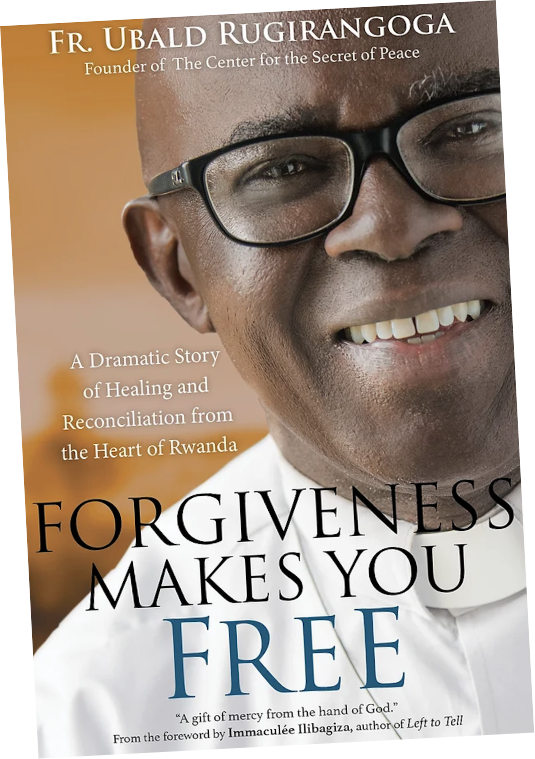
BOOK
Forgiveness Makes You Free
A dramatic story of Healing and reconciliation from the Heart of Rwanda.
DOCUMENTARY
Forgiveness: The Secret of Peace
Forgiveness: The Secret of Peace is a documentary film on the life and work of Fr. Ubald Rugirangoga, a 57-year-old Catholic priest in Rwanda.
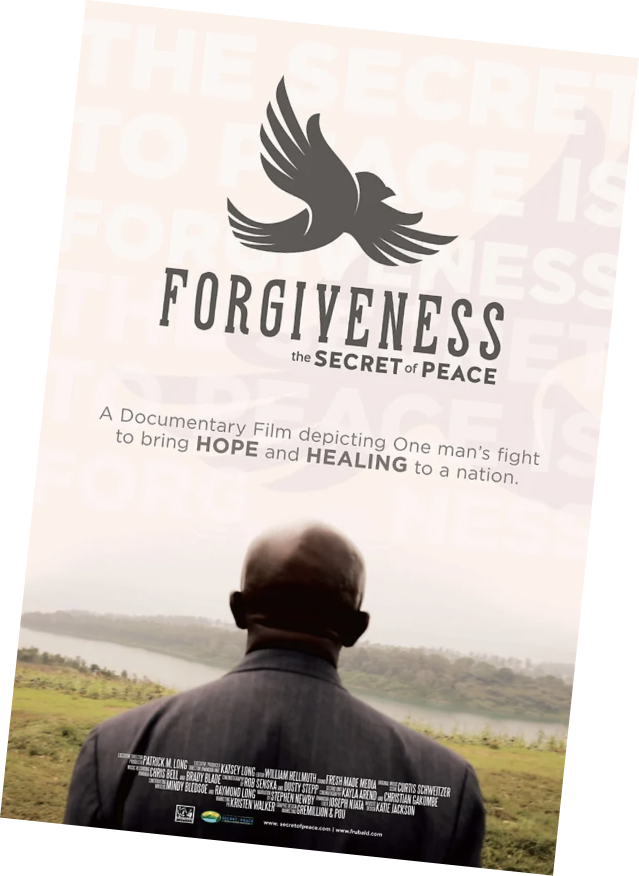

BOOK
Forgiveness Makes You Free
A dramatic story of Healing and reconciliation from the Heart of Rwanda.
DOCUMENTARY
Forgiveness: The Secret of Peace
Forgiveness: The Secret of Peace is a documentary film on the life and work of Fr. Ubald Rugirangoga, a 57-year-old Catholic priest in Rwanda.

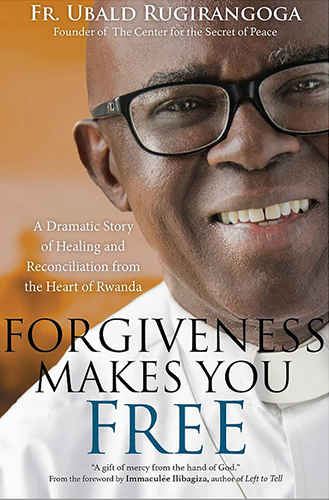
BOOK
Forgiveness Makes You Free
A dramatic story of Healing and reconciliation from the Heart of Rwanda.
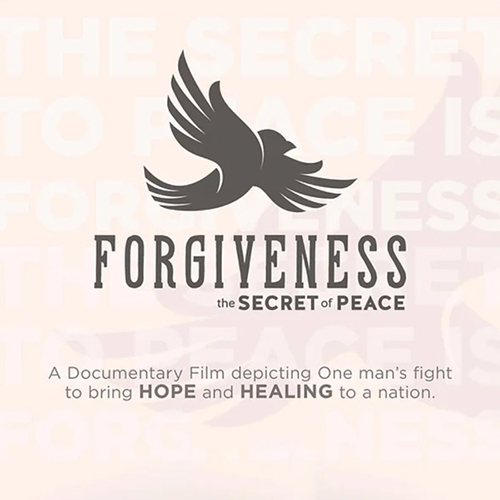
DOCUMENTARY
Forgiveness: The Secret of Peace
Forgiveness: The Secret of Peace is a documentary film on the life and work of Fr. Ubald Rugirangoga, a 57-year-old Catholic priest in Rwanda.
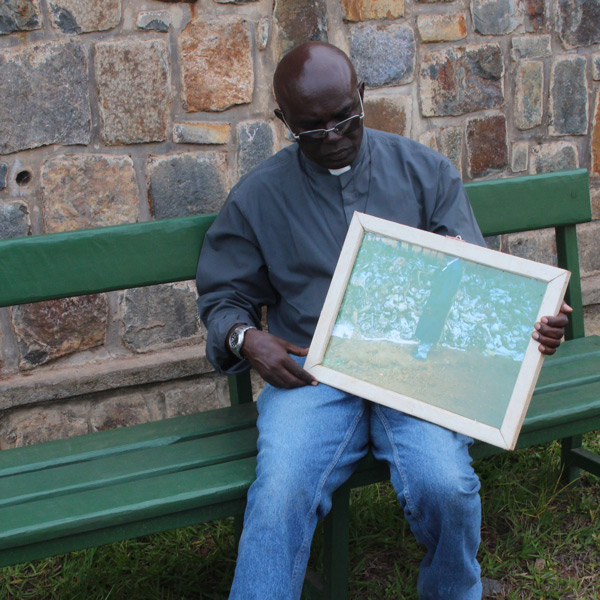
ARCHIVES
From Ted talks to Facebook live videos, Father Ubald left behind so much for us.

ARCHIVES
From Ted talks to Facebook live videos, Father Ubald left behind so much for us.
The Latest News & Events
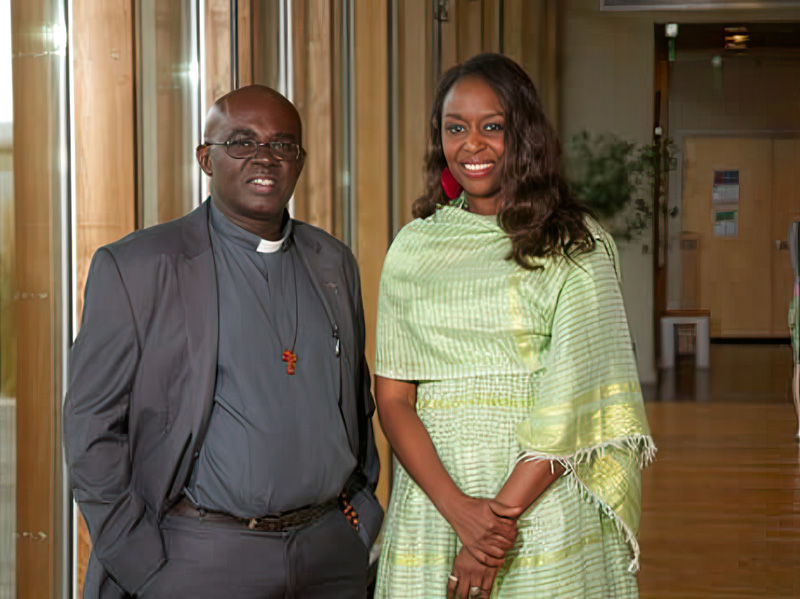
“Let’s Make Joy” Benefit Dinner & Silent Auction
“Let’s Make Joy” Dinner & Silent Auction in Chicago! Featuring guest speaker Immaculée Ilibagiza, close personal friend of Fr. Ubald.
Thursday, October 17, 2024 | 6pm
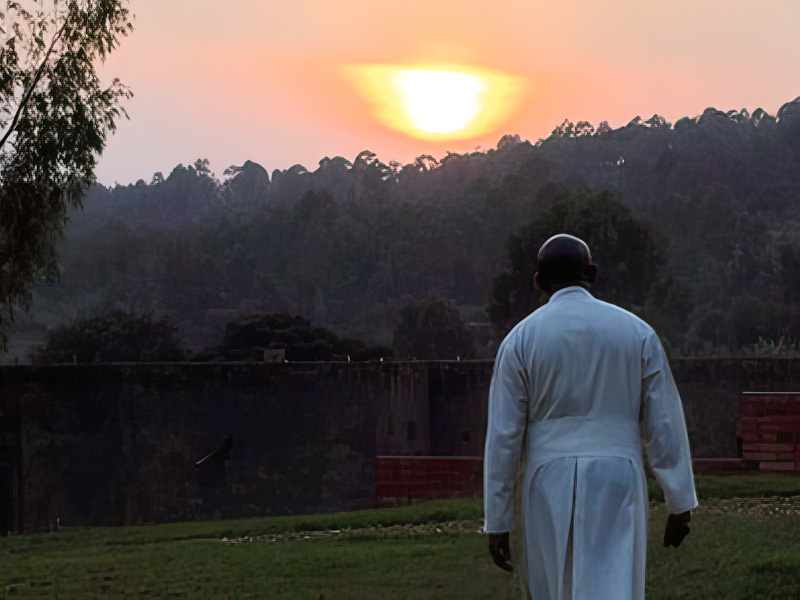
Looking Toward Sainthood for Our Beloved Father Ubald
For those who knew Father Ubald personally, there is no doubt in our minds that he is in Heaven soaking in the joys of eternal life with the Holy Trinity, Mary, the saints and his beloved Rwandan family.
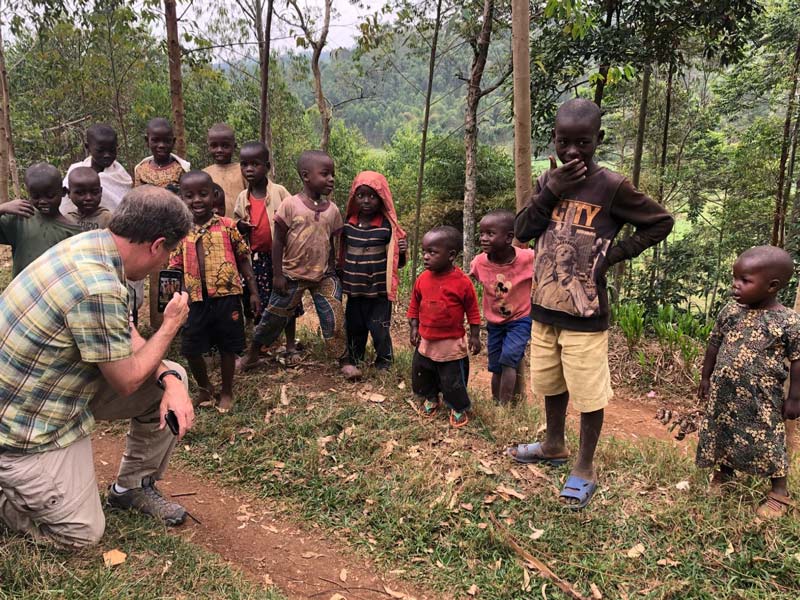
Reflection On My Travels to Rwanda
Having just returned from Rwanda, here are a few reflections. The Center for the Secret of Peace grounds were beautiful with lots of visitors and pilgrims.

